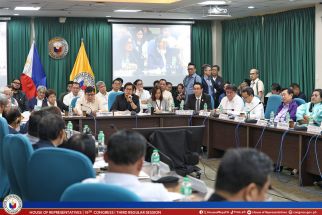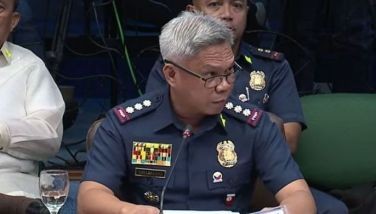US restores $30-M military aid to RP

November 1, 2002 | 12:00am
SAN FRANCISCO (via PLDT) — The US government has restored a $30-million military assistance to the Philippines, which was among the allocations under its $5-billion supplemental budget for 2002 slashed by the US Congress, President Arroyo said here yesterday.
The President wants the military assistance extended to the Philippines in the form of a C-130 cargo plane, helicopters and bullet-proof vests for troops in the field.
"I’m not a soldier but these are my ideas on how we shall use this amount," she said.
The US government originally offered to provide Mrs. Arroyo with a presidential plane for $30 million after they found out about her "troubles" with the repair of an aging Fokker jet for her use. It was embroiled in a litigation suit and its engines later repossessed and taken to a US-based repair subcontractor.
"But I told them that I would rather have a fighter plane than a presidential plane for myself," she said.
Though she is no expert on military matters, Mrs. Arroyo said she would like to make use of this $30-million military assistance to help improve the capability of the Philippine military for airlift movement and transport of its troops, as well as bullet-proof vests to aid soldiers in the fight against local terror groups.
Mrs. Arroyo made the announcement in the presence of Ambassador to Washington Alberto del Rosario, whom she instructed to closely monitor the promised restoration.
The restoration of the $30-million military assistance to the Philippines will be accomplished by the American government through the realignment of funds that it will raise through other sources in its 2002 budget.
The President added that this restoration of the $30 million is over and above the economic support fund of the US to the Philippines because of the commitment made to her by Hawaii Sen. Daniel Inouye.
Inouye promised to make a "senatorial insertion" in the proposed US budget for 2003, which is currently undergoing deliberations in the US Congress.
"In effect, we will be getting more assistance," she said.
The $30-million military assistance to the Philippines is part of the $5-billion military aid the US government grants to their allies — like Israel, Pakistan and India — earlier cut by Congress due to budget deficit problems of the US government.
During her one-on-one meeting at the sidelines of the recently concluded Asia-Pacific Economic Cooperation (APEC) Leaders’ Summit in Mexico, Mrs. Arroyo said US President George W. Bush Bush told her he was working on the restoration of the $30-million military assistance.
She had expressed confidence the financial aid would be restored because "operations people" from both countries are "talking to each other."
Another form of military assistance Mrs. Arroyo and Bush "pretty much approved" was the additional flights of American surveillance satellites over the Philippines to monitor the whereabouts and movements of terrorists, especially in southwestern Mindanao.
Amid criticisms of supposed failure of intelligence on the part of Philippine security authorities, Adm. Thomas Fargo, commander of US forces in the Pacific, agreed to beef up intelligence-gathering against terrorists, especially those hiding in the thickly forested jungles of Mindanao.
Fargo earlier discussed the surveillance satellites with Mrs. Arroyo when she arrived Thursday last week in Honolulu for a one-day stopover visit.
The President noted with satisfaction that the US government’s response to her request for assistance in the anti-terror war yielded positive results at this year’s APEC summit.
Bush and other world leaders, she said, have acknowledged that the fight against terrorism should be closely linked with the battle against poverty, which can serve as a breeding ground for potential terrorists.
"It is not the role of the US to improve the Philippine situation. It is the role of Filipinos to improve their situation. But there is a role for the US in the improvement of the Philippine situation," she said.
Mrs. Arroyo explained that "the role developed nations have in improving the life of developing nations... if you want the developing countries to help the developed countries win the war against terrorism, the developed countries must help the developing countries win the war (against poverty)."
The President wants the military assistance extended to the Philippines in the form of a C-130 cargo plane, helicopters and bullet-proof vests for troops in the field.
"I’m not a soldier but these are my ideas on how we shall use this amount," she said.
The US government originally offered to provide Mrs. Arroyo with a presidential plane for $30 million after they found out about her "troubles" with the repair of an aging Fokker jet for her use. It was embroiled in a litigation suit and its engines later repossessed and taken to a US-based repair subcontractor.
"But I told them that I would rather have a fighter plane than a presidential plane for myself," she said.
Though she is no expert on military matters, Mrs. Arroyo said she would like to make use of this $30-million military assistance to help improve the capability of the Philippine military for airlift movement and transport of its troops, as well as bullet-proof vests to aid soldiers in the fight against local terror groups.
Mrs. Arroyo made the announcement in the presence of Ambassador to Washington Alberto del Rosario, whom she instructed to closely monitor the promised restoration.
The restoration of the $30-million military assistance to the Philippines will be accomplished by the American government through the realignment of funds that it will raise through other sources in its 2002 budget.
The President added that this restoration of the $30 million is over and above the economic support fund of the US to the Philippines because of the commitment made to her by Hawaii Sen. Daniel Inouye.
Inouye promised to make a "senatorial insertion" in the proposed US budget for 2003, which is currently undergoing deliberations in the US Congress.
"In effect, we will be getting more assistance," she said.
The $30-million military assistance to the Philippines is part of the $5-billion military aid the US government grants to their allies — like Israel, Pakistan and India — earlier cut by Congress due to budget deficit problems of the US government.
During her one-on-one meeting at the sidelines of the recently concluded Asia-Pacific Economic Cooperation (APEC) Leaders’ Summit in Mexico, Mrs. Arroyo said US President George W. Bush Bush told her he was working on the restoration of the $30-million military assistance.
She had expressed confidence the financial aid would be restored because "operations people" from both countries are "talking to each other."
Another form of military assistance Mrs. Arroyo and Bush "pretty much approved" was the additional flights of American surveillance satellites over the Philippines to monitor the whereabouts and movements of terrorists, especially in southwestern Mindanao.
Amid criticisms of supposed failure of intelligence on the part of Philippine security authorities, Adm. Thomas Fargo, commander of US forces in the Pacific, agreed to beef up intelligence-gathering against terrorists, especially those hiding in the thickly forested jungles of Mindanao.
Fargo earlier discussed the surveillance satellites with Mrs. Arroyo when she arrived Thursday last week in Honolulu for a one-day stopover visit.
The President noted with satisfaction that the US government’s response to her request for assistance in the anti-terror war yielded positive results at this year’s APEC summit.
Bush and other world leaders, she said, have acknowledged that the fight against terrorism should be closely linked with the battle against poverty, which can serve as a breeding ground for potential terrorists.
"It is not the role of the US to improve the Philippine situation. It is the role of Filipinos to improve their situation. But there is a role for the US in the improvement of the Philippine situation," she said.
Mrs. Arroyo explained that "the role developed nations have in improving the life of developing nations... if you want the developing countries to help the developed countries win the war against terrorism, the developed countries must help the developing countries win the war (against poverty)."
BrandSpace Articles
<
>
- Latest
- Trending
Trending
Latest
Trending
Latest
Recommended































